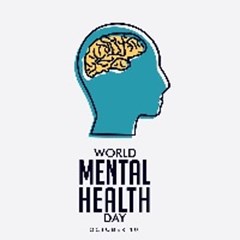Tue 9 Oct. 2018
Why the Institute supports World Mental Health Day

Respected science writer and neuropsychology researcher, Aaron Reuben, says we are more likely to experience a bout of mental illness than to develop diabetes, heart disease or any kind of cancer.
October 10 marks World Mental Health Day and NHS figures from a 2015 survey reveal the average person has a 1 in 4 chance of developing a mental health issue in the next 12 months – with an estimated 1 in 6 people likely to experience a common mental health problem any given week.
Government figures for the financial services industry reveal that almost 40% of all sickness days are due to mental ill health compared to 11.5% of all sickness absence days in the UK being attributable to it.
Sixty four per cent of financial services employees reported having experienced a mental health issue as a result of work according to a Business in the Community’s (BITC) report in 2017. The study also highlighted that 30% of financial services staff have been formally diagnosed with a mental health condition – with one in five (21%) experiencing behavioural, psychological or physical symptoms of poor health in the last month.
On the positive side, the BITC report also revealed that financial services staff who experience mental health issues feel more comfortable about approaching somebody at work than those in other sectors.
We’ve seen a huge uptake in organisations investing in Mental Health First Aiders, with some firms making them a mandatory part of every office. We’re also witnessing how organisations like Jelf and Marsh roll out wheat they’ve learnt to clients as Mental Health Risk Management offerings.
It’s great to see this formerly taboo topic being talked about at all levels, not only within the industry, but externally with clients too. But how do we keep it up? By continuing to talk (and listen!) when it comes to mental health issues. Whether they’re your own issues, a family member’s or a friend’s – keep talking!
If you’re struggling with mental health issues, speak to your line manager or your organisation’s Employee Assistance Helpline in the first instance. The Institute also has a number of Mental Health First Aiders within the council committee who would be more than willing to go for a coffee and chat.
Whatever your situation, don’t struggle in silence.
